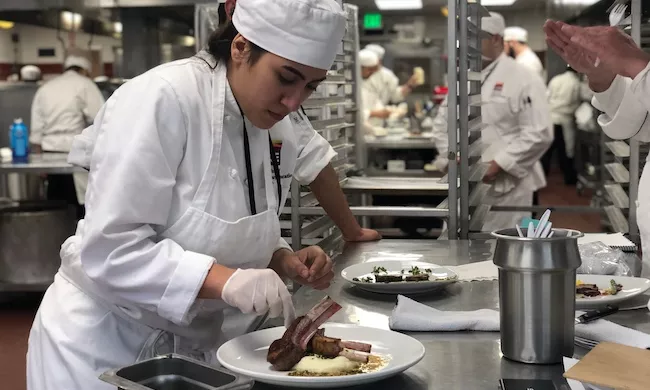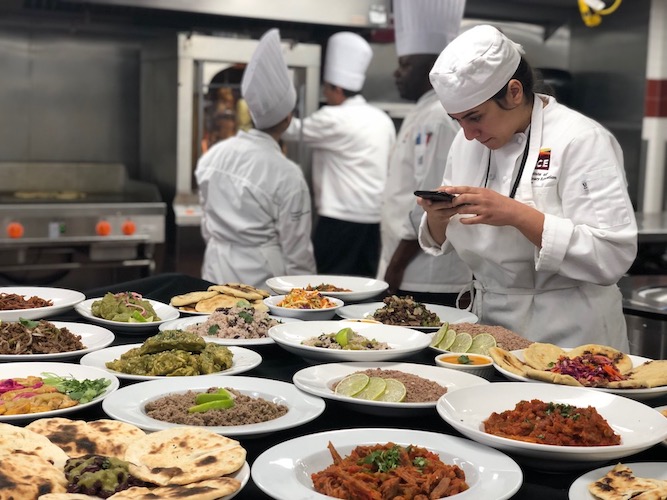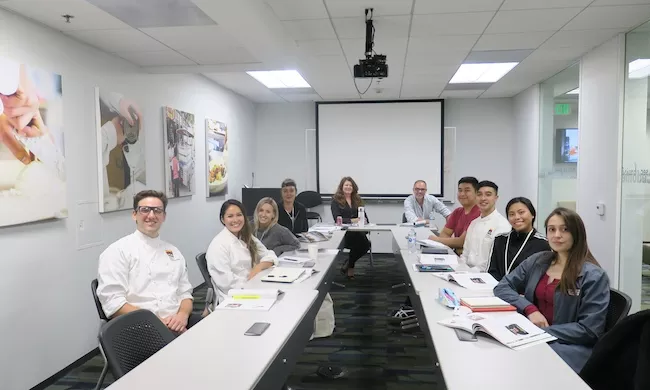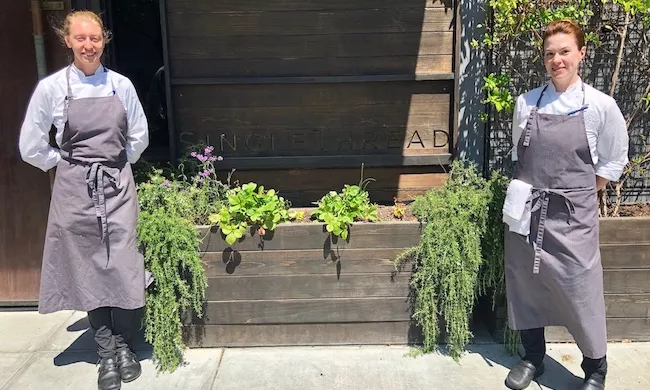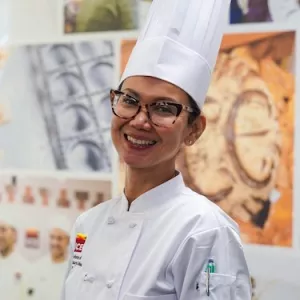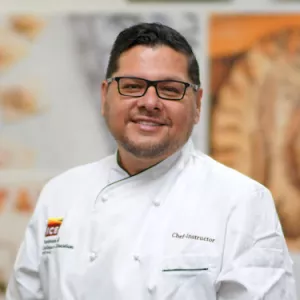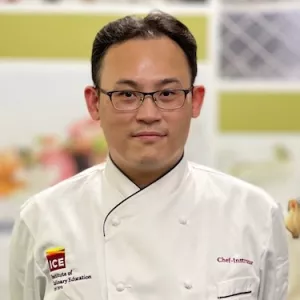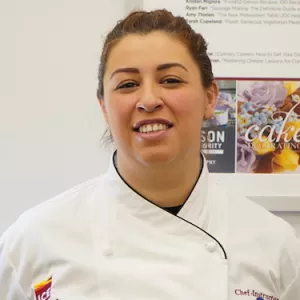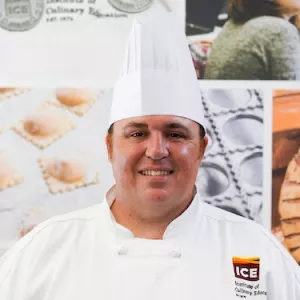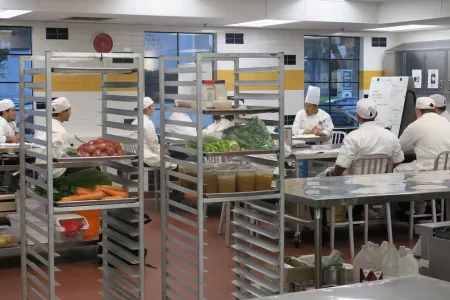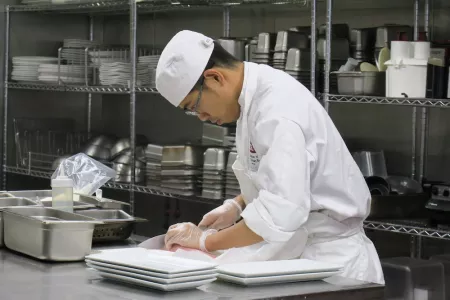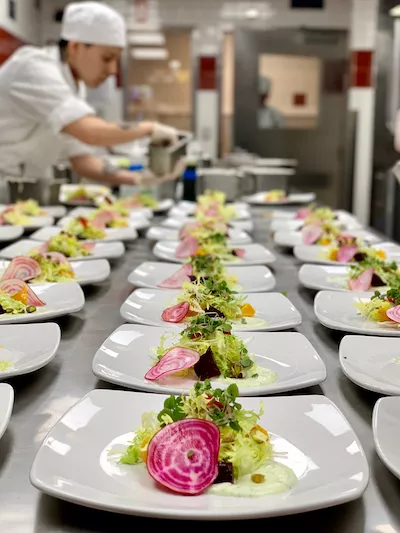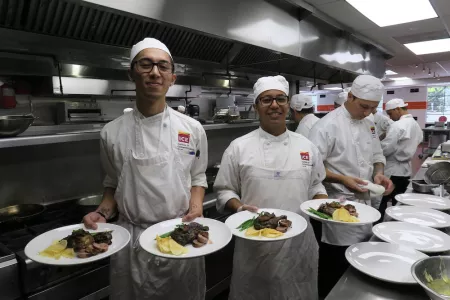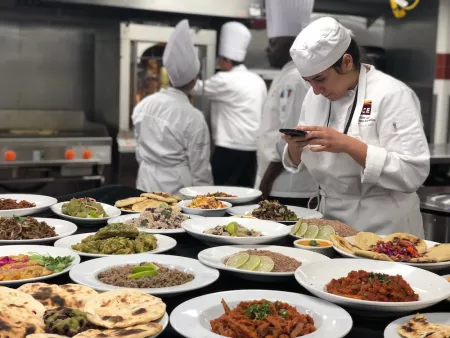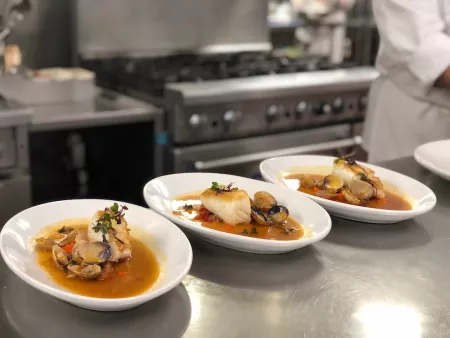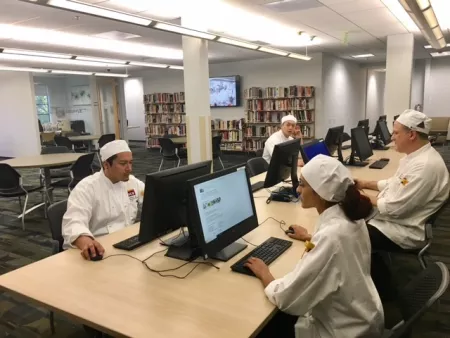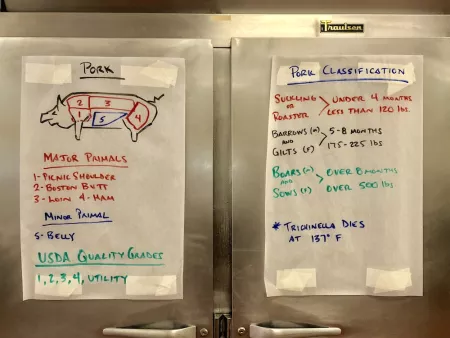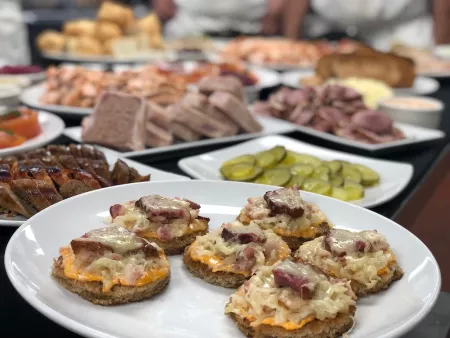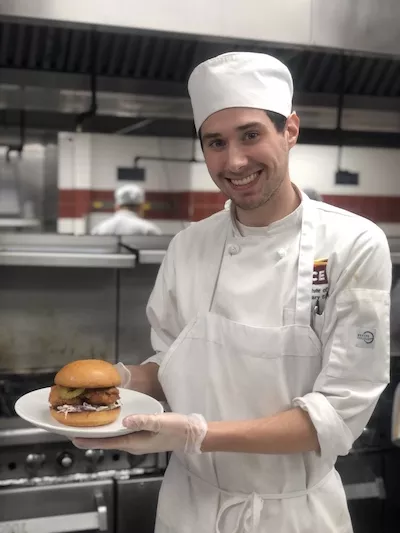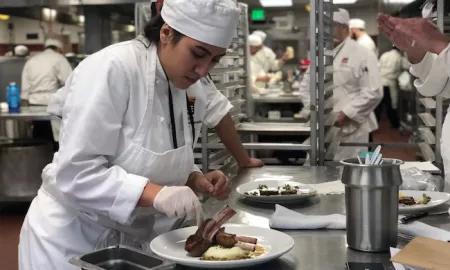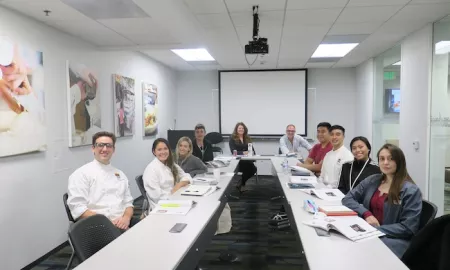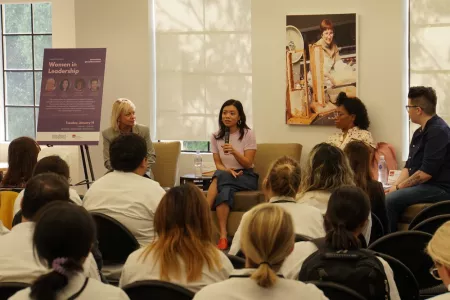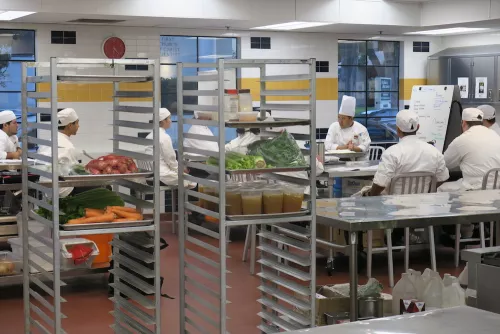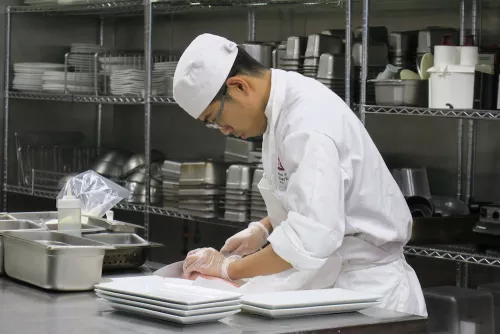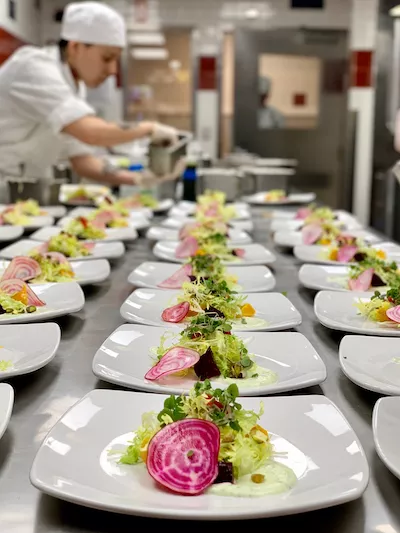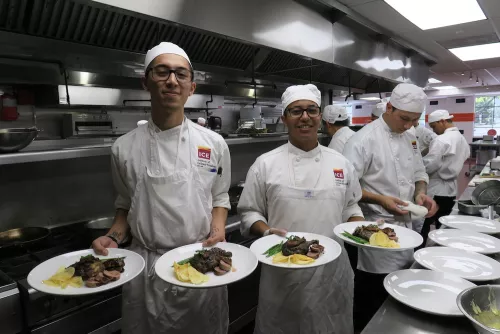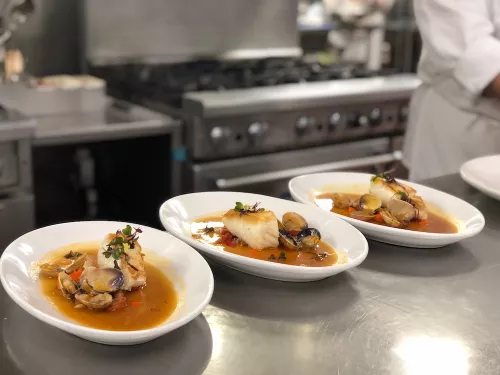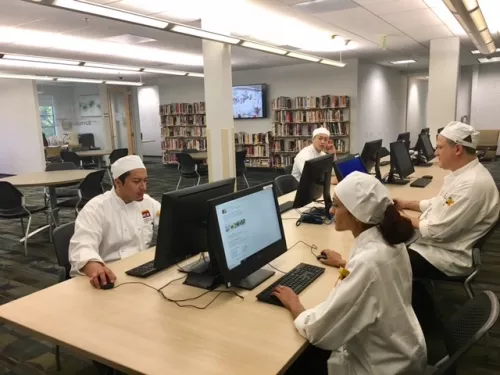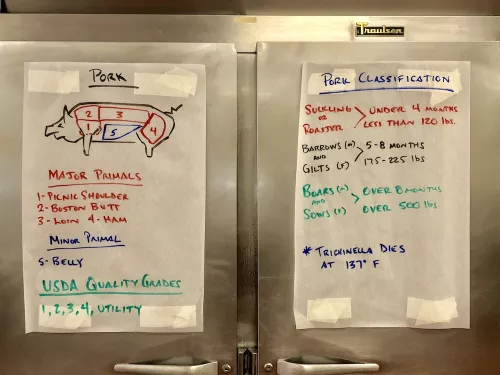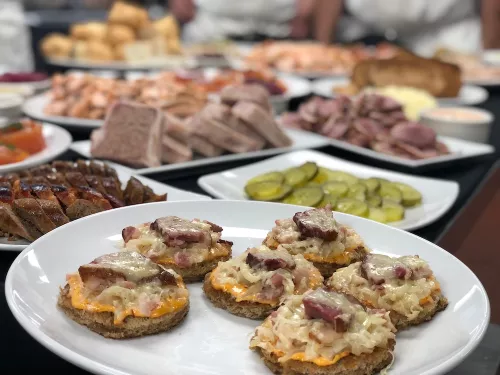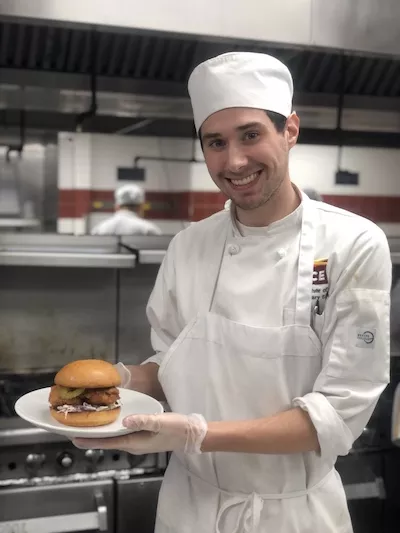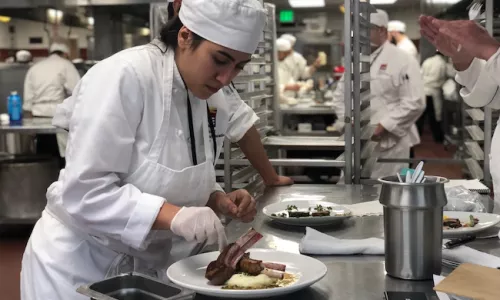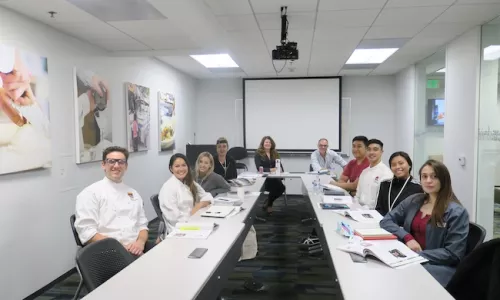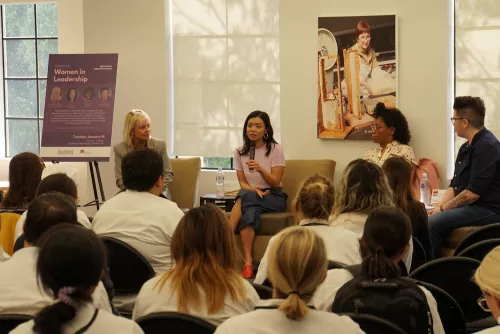Culinary Fundamentals 1 - Kitchen Essentials
2.5 Credits
Most culinarians begin their culinary journey by learning how to pare and prepare greens and vegetables. After a comprehensive introduction to knife skills and food safety, you’ll use a range of methods for preparing vegetables, progressing from salads to complex vegetarian cuisine, as you begin to explore the techniques that underlie fine cooking.
Course Highlights:
- Grilled Eggplant and Portobello Sandwich with Fresh Mozzarella and Romesco
- Vegetarian Three-Bean Chili with Ancho and Sweet Chili Peppers
- Grain Bowl with Quinoa/Lentil Pilaf and Roasted Vegetables
Culinary Fundamentals 2 - Poultry, Pork & Lamb
2.0 Credits
The first in a series of three courses on protein-based cuisine, this course will stress key techniques like sautéing, roasting, braising and grilling. With an emphasis on sustainability, you will fabricate the essential cuts and prepare stocks and sauces that completely utilize each ingredient. Then you’ll prepare dishes to practice each technique and build your confidence and competence.
Course Highlights:
- Sous Vide Chicken Breast with Jus Lie
- Sautéed Duck Breast with Orange Gastrique
- Pan Roasted Rack of Lamb with Red Wine pan sauce
- Grilled Brined Pork Chop with Caramelized Onion and Bourbon Sauce
Culinary Fundamentals 3 - Veal, Beef & Seafood
2.0 Credits
Structured in the same way as Course 2, you’ll fabricate steaks, paillards, cutlets and chops, and prepare soups, brown sauces and pan sauces as you continue to deepen your understanding of fundamental techniques. You’ll also apply these methods to seafood, including flatfish, round fish and shellfish as you prepare dishes that highlight the special skills that these foods require.
Course Highlights:
- Braised Osso Bucco with Risotto
- Sautéed Filet Mignon with Bearnaise
- Lobster Bisque
- Grilled Tuna with Beurre Rouge
Plating & Restaurant Simulation
2.0 Credits
In this final course of the series, you’ll further refine your abilities as you focus on preparing game specialties like rabbit, quail and venison. You will also plate entrées as you simulate the experience of cooking in a restaurant.
Course Highlights:
- Roast Squab with Dirty Rice and Pan Gravy
- Braised Rabbit with Prosciutto and Red Onions
- Pan-Roasted Cod with Manilla Clams and Chorizo
- Grilled Hangar Steak with Caramelized Shallots and Chive Mashed Potatoes
Pastry & Baking
2.0 Credits
The skills taught in this course are not just for desserts – they can be used in savory cooking as well. From custards and pizza to biscuits and frozen desserts, you will prepare specialties that can be part of exciting entrees or memorable finales to the dining experience.
Course Highlights:
- Chocolate Soufflé
- Sweet and Savory Quick Breads and Biscuits
- Pizza and Flatbreads
- Crème Brulee
International Cuisine 1 - Mediterranean, the Americas, & Asia
2.0 Credits
Mediterranean cuisine, from Greece to North Africa, exerts an important influence on the way many chefs cook today. You will explore the staple ingredients, various flavor profiles and key dishes of the region and use them as a portal to studying the foods of the Americas.
The panoply of Asian flavors and techniques exert a growing influence on culinary arts around the world. Understanding how to use the herbs, spices, ingredients and methods that characterize these cuisines is a necessity in today’s global food scene. Centering on flavor profiles and specific techniques, this course acquaints students with the essential dishes of India, China, Japan and Thailand.
Course Highlights:
- Falafel
- Roast Turkey with Mole Negro
- Jamaican Jerk Chicken
- Pad Thai
- Northern Indian Lamb Curry
- Sushi
International Cuisine 2 - France, Italy & Garde Manger
2.0 Credits
France is considered the touchstone for all Western cuisines – and for good reason. In this course, students become familiar with characteristic ingredients, methods and dishes from some of the most important culinary regions in the country: Provence, Burgundy, Normandy and Alsace.
Regionality is the essence of all things Italian and this concept is central to our presentation of Italian cuisine. We’ll focus on Piedmont, Tuscany, Abruzzo and other regions that comprise what we think of as modern-day Italian cuisine. Using authentic recipes and ingredients, students can come to appreciate the diversity and simplicity that characterize this important European cuisine.
Course Highlights:
- Bouillabaisse with Rouille
- Cassoulet
- Fresh Egg Pasta with Pesto
Advanced Cuisine
2.5 Credits
Whether it’s hydrocolloids, fermentation or zero-waste cooking, today’s kitchens rely on innovative ideas and modern techniques to produce signature dishes. In this course, you’ll study the methods and flavors that the best restaurants are using to take food to the next level and create enjoyable dining experiences. Finally, with a basket of seasonal ingredients, students will work alone to create unique menus that demonstrate their skill and creativity.
Course Highlights:
- Fermentation, Preserving and Pickling
- Introduction to Hydrocolloids
- Zero-Waste Cooking
- Cooking of the Contemporary Masters
Concept Development & Menu Design
3.0 Credits
This course is designed to acquaint students with the realities of a culinary business concept — from creativity to profitability. By surveying the industry, students explore all types of operations and analyze concepts, as well as research feasibility and location selection. Students gain the knowledge required to develop and refine their ideas. This course also gives a comprehensive view of key aspects of the menu, including planning, pricing, layout, and design. Students prepare sample menus as a project, which will become part of their final business plans.
Marketing
2.0 Credits
Culinary businesses are marketing businesses from the moment an idea is developed through opening and operation. This course provides an in-depth examination of how a marketing plan is developed, including market research, positioning, product mix, and life cycle. This includes development of potential strategies for advertising, merchandising, public relations, social media, and promotion.
Food Safety
1.0 Credit
Proper food handling and safety procedures are important elements of a successful culinary business. In this course, students earn the nationally recognized ServSafe certification while learning the essential principles of food safety.
Purchasing & Cost Control
3.0 Credits
Strategies for purchasing and control are vital for the success of any culinary operation. This course examines labor, beverage and food costs, and revenue control. Purchasing guidelines, inventory and control, employee-performance standards, productivity and scheduling, use of point-of-sale systems, computers, and new technology are also reviewed.
Supervisory Management & Food Service Law
3.0 Credits
People are the most important resource in any culinary business. In this course, students focus on the major functions of management, including leadership, motivation, communication, hiring practices, recruitment, training, discipline and staff organization. In addition, this course focuses on the legal rights and responsibilities of owners and operators. Topics include labor relations, employment law, real estate and contracts. Various business structures are also surveyed.
Service Management
2.0 Credits
Managing the front of the house requires particular knowledge and skill. Students are introduced to the tools and techniques of service and service management in restaurants and other foodservice operations. This course also covers how to build customer satisfaction.
Finance & Accounting
3 Credits
A working understanding of numbers is critically important to culinary success. The curriculum for this course focuses on the use of financial statements as a tool for control and decision-making. Topics include balance sheets, statements of net income, break-even analysis, cash flow and financing. Budgets, industry standards and variation analyses are emphasized. Actual case studies are used to provide real experience.
Beverage & Wine
2.0 Credits
Beverage sales is a challenging business. This course explores all areas of beverage service, including wine, spirits, beer, mixology, nonalcoholic drinks and bar design. Wine tasting and appreciation are included. Students will study proper alcohol service and receive safe beverage service certification.
Facilities & Design
2.0 Credits
This course examines how to bring a concept to life, from design through construction and final inspection. Whether planning to renovate or build a restaurant from scratch, students gain insight into capital costs and budgeting, as well as how to work with architects, designers and contractors. Topics include equipment and systems basics, space analysis, product and people flows, and kitchen and interior design.
Social Psychology and Interpersonal Relations
3.0 Credits
This course will examine social context and the way it influences our thoughts, feelings and behaviors. Students will be encouraged to reflect on the application of social psychology concepts to real-world problems and to incorporate concepts explored in class to relevance in their own lives.
Business Communications
3.0 Credits
This course introduces students to the foundations of communication in a culinary business setting. This course will examine and apply the types and purposes of various business documents; create messages using appropriate channels for delivery based on context, audience and purpose; and explore the effect of technology, such as social media, on business communication. Students will also study written and verbal communication strategies as they relate to recipe writing, reviewing, food blogging and culinary demonstrations.
Food and Applied Nutrition
3.0 Credits
An introductory course in the study of the principles of human nutritional needs. Students examine current dietary guidelines, the function of nutrients and dietary preferences. Students will study menus and recipes for modifications to optimize nutritional content and balance the current trends in nutritional study with culinary and baking techniques. The course highlights the relationship between diet, health, disease and how applied nutrition can benefit not only immune-challenged populations but average healthy populations as well.
Leadership, Team Building and Change Management
3.0 Credits
Great leadership goes beyond good management and permeates a culture. This course will explore leadership variables and principles, the power of vision, the importance of ethics, the empowerment of people, understanding people, multiplying effectiveness, developing others, and performance management. Additionally, in this course, students will identify their own leadership styles and how best to utilize them to maximize leadership through organizational change and team building.
Career and Self-Management
2.0 Credits
This course is designed to enhance student success in transitioning to, and succeeding in, the hospitality industry by providing career planning tools, expected behaviors, and soft skills essential for career success. The course emphasizes three key areas for professional success: life planning, workplace skills and career planning. Students study how to connect personal, professional and financial goals and how these goals ultimately contribute to career and personal success.
The History and Culture of Food
2.0 Credits
This course explores the importance of food and foodservice throughout history, from prehistoric times to the present. The historical influence on modern foodservice is analyzed, and culinary trends in history are identified and investigated. Topics will include the relation of food to personal and cultural identity and the interconnections between cuisine, historical events and international locations.
Externship
8.0 Credits
This is the last course in the program in which students work at a foodservice-related site. While ICE strongly recommends that students extern in restaurant kitchens, they may request venues such as hotels, catering companies, corporate dining rooms or test kitchens in accordance with their professional goals.
